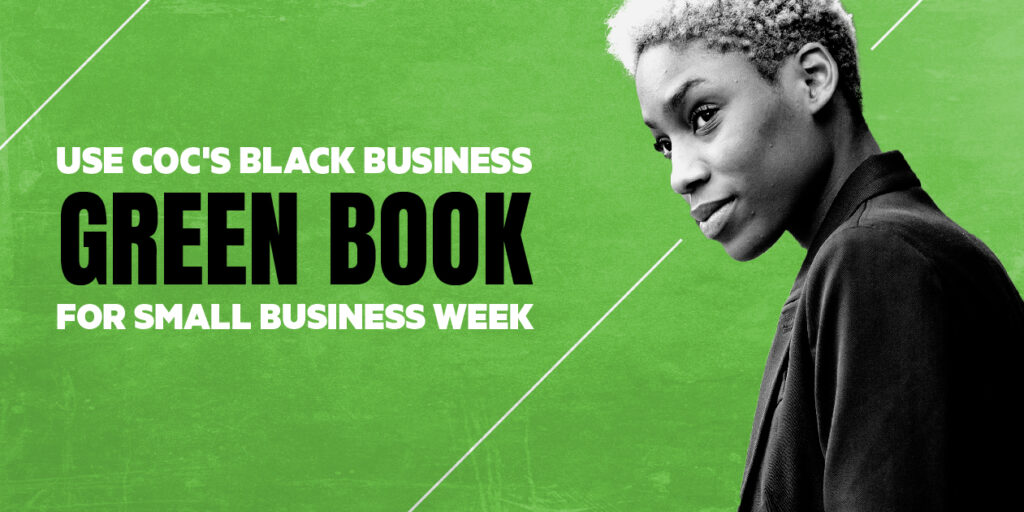On Small Business Saturday, Nov. 26, let COC’s Black Business Green Book be your guide

By Liz Courquet-Lesaunier
’Tis the season for crossing items off your holiday shopping list. But when it comes to deciding what to buy for your friends and family — as well as where to buy it — the realities of our ongoing national racial reckoning can’t be denied.
How do you know the store isn’t paying Black workers less, or refusing to hire or promote them? Does a shop owner who smiles in your face while taking your dollars then donate that cash to political candidates or organizations working to strip away hard-won civil rights?
That’s where Color Of Change’s Black Business Green Book comes in.
The free, searchable online guide features roughly 1,500 Black-owned businesses — both brick-and-mortar shops and online. Retailers in the book offer goods and services in a wide range of categories, from fitness and wellness to home decor to personal grooming services.
Amanda Jackson, director of economic justice with COC’s Corporate Accountability Team, said the buyer’s guide spotlights “how Black businesses are a pillar of the Black community.”
In the broader retail landscape, not many businesses operate through a lens of equity. Erica Mateo, deputy senior campaign director of COC’s Corporate Accountability Team, said some corporations conduct business “in a way that discriminates against Black folks.”
That’s despite the massive economic clout of the Black community.
For example, a recent Gallup poll found that Americans plan to spend an average of $932 on gifts this holiday season, and Nielsen data shows that Black consumers typically spend more on holiday shopping than other groups. Black buying power, meanwhile, is expected to grow to $1.98 trillion by 2025.
Yet large corporate retailers like Walmart and Target may make public statements about valuing diversity or make a one-time donation to social justice causes, but ultimately don’t end up changing their practices — or are run mostly or entirely by white leadership.
By using the Black Business Green Book as a shopping resource, Mateo said, consumers are “uplifting Black businesses where people can shop alternatively to those larger corporate businesses, which we need to continue to hold accountable.”
The idea for COC’s Black Business Green Book emerged in 2020, in the aftermath of protests over George Floyd’s murder and the COVID-19 pandemic. The one-two punch of massive street demonstrations and pandemic lockdowns in major cities devastated many Black businesses.
“So much of where we were at that time was, is there a recession? Isn’t there a recession?” Jackson said. No one knew, she said, whether Black businesses would survive.
The Green Book, Mateo said, was an “important” solution. It linked consumers who wanted to show support for the Black community with Black retailers who desperately needed customers. By buying Black, she said, consumers can “put your money where your assets are” by “supporting small Black businesses so that they can continue to grow.”
Even the name of the directory was “really intentional,” Mateo said. It’s a direct homage to the “The Negro Motorist Green Book,” a travel guide published annually from 1936 to 1966 by Victor Hugo Green, a New York City-based mail carrier and travel writer, to help Blacks on the road find welcoming businesses during Jim Crow.
Before passage of the Civil Rights Act of 1964, “Black folks quite literally couldn’t use restaurants, or the restroom, after the sun went down,” Jackson said, because of Jim Crow laws and armed white supremacists. The Green Book guided Black motorists away from dangerous “sundown towns” and hostile, whites-only establishments to hotels, restaurants and other businesses that welcomed Black people.
Similarly, COC’s Black Business Green Book, which is searchable by state and type of business, identifies where Black folks can spend their dollars to support Black communities.
Mateo cautioned that Color Of Change isn’t merely “pushing Black businesses because we have a framework of pro-capitalism.”
Instead, she said small Black businesses exist within an ecosystem of families and communities. When you shop at one, you’re potentially supporting putting a kid through college and building community.
“We’re hoping that you see this in our listings — that the kind of products are in support of Black people, Black culture and Black families,” Mateo said.
To view the list of Black businesses in your area, click here.

